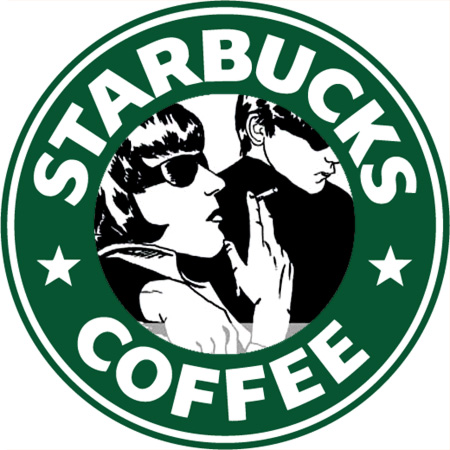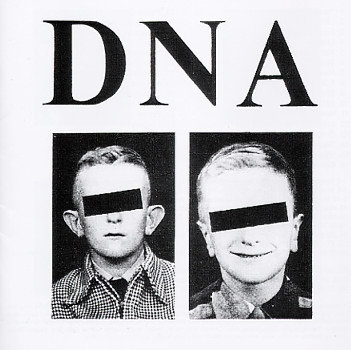May 10, 2009
Avant-conservatism

OK, this is the last thing I'm going to post on Sonic Youth - there are so many more interesting things to write about just now. But I must take up some of the issues raised by Zone's reply. I'd also like to draw people's attention to Marcello's interesting remarks on SY (which are particularly good in relation to my improv-provocations).
Zone's attempt to psychopathologise my SY-disdain, to attribute it to the loathing only a double can provoke, would be more convincing if it weren't based on SY and I "sharing an admiration for whole swathes of postpunk, pop, and modernism low and high (Burroughs, P. K. Dick, William Gibson, Joyce, The Carpenters etc)." The list is hardly specific to either SY or me; rather, it enumerates preferences that are practically ubiquitous amongst people of a certain age with 'countercultural' sympathies. If he'd included John Foxx and Visage in the list, I might have been persuaded. (Incidentally, while we're on electronic music: my point was not that electronic music is immune to entropy - a claim that would undercut everything I've written about hauntology and the argument I made in New Statesman only last week. The point, rather, was that electronic music is not tied to a romanticism of youth in the way that rock is - so that Kraftwerk in their 60s does not produce the same frission of grotesquerie that the geriatric Stones and Stooges do.)
Contra what Seb in Zone's comments suggests ("I'm ... glad to see someone cook up a convincing explanation of K-Punk's oddly intense enmity towards SY"), it's not my hostility towards SY that requires explanation - it's SY's hegemonic support that needs to be accounted for. But I think that this characterisation of my response tells its own story. If a group were genuinely challenging and experimental, "oddly intense emnity" would surely be expected from some quarters. But the point is that no-one, even their own supporters, really expects SY to provoke any sort of strong affect at all, just elicit a bland admiration. They're on our side, they're good sorts. And the fact is, it is indeed difficult to summon up any affect for them. The emnity is a second-order response to my first order action, which is one of boredom. (A boredom that I strongly suspect is shared by even their most ardent fan - could such a fan sincerely claim that the thought do we really need another Sonic Youth record? has never come to mind?) This renormalisation of boredom, this re-establishment of consensus around 'accepted standards', is precisely what is so pernicious about Sonic Youth now. They represent the embourgeoisiement of the rock avant-garde, its disconnection from overreaching, intemperance, intolerance and antagonism.
"Sonic Youth are banished from ‘mainstream’ taste forever," Zone argues. "Kim Gordon in growl mode, the abstract-expressionist noise breaks, performance artists Bob Flanagan and Sherry Rose wiping their arses with stuffed toys on Dirty's artwork." But Zone's inverted commas around 'mainstream' are entirely necessary - for the idea there is a mainstream which repudiates Sonic Youth is the fundamental (rockist) fantasy which feeds their allure. Kim Gordon in New Statesman last week: "Are Sonic Youth political? Well, they are, in that they offer an alternative to mainstream music." Well, they may not have hit singles (but neither did the prog dinosaurs of the 70s); but here they are on Later With Jools Holland; here they are doing compilations for Starbucks; here they are, the darlings of the broadsheet press, their pastiche-of-themselves records not exactly guaranteed a good review, but always automatically accorded event status. In what way is the so called mainstream perturbed by any of this? In what way, in the decentred era of web 2.0, is this not the mainstream? Their avant credentials rest on a few hoary old formal innovations - just as the prog rockers' did in the early 70s. SY have disconnected experimentalism from social and existential maladjustment, just as prog rock did. But while punk annihilated prog after a mere half a decade of flatulent complacency, Sonic Youth are still lauded as countercultural heroes even though they have been making variations on the same record for over twenty years now.

SY's precise function for Restoration culture is to be a hypervisible simulation of an alternative within the mainstream. That is why Juno provides such a depressingly accurate picture of certain impasses in US alt.rock culture: a supposedly smart alt.teen (not so smart that she avoids getting pregnant, though) as poster girl for reproductive futurism, giving up her child to baby-crazed professional, whose husband - a failed rocker now miserably writing advertising jingles - turns her onto Sonic Youth. The fact that Juno - who is into Patti Smith and The Stooges - has mysteriously not heard of Sonic Youth is the key to their fantasy positioning. When she falls out with the husband, Juno says that she "bought another Sonic Youth CD and it's just noise" - at this point, everyone's happy: SY are namechecked in an indie-mainstream commodity, but posited as something that is ultimately too extreme. There is no more stultifying mode of cultural conservatism than this avant-conservatism.
SY's popularity provides another angle on the hipster debate from last year. As Ray Brassier, someone who shares my dismay and disappointment about SY's pre-eminence, puts it (via email):
- there's a perfect sociocultural congruence between SY as individuals and their audience: that burgeoning of a vast college educated middle class audience for "alternative rock" in the 80s and 90s: graduates wanting something a little bit artier and recherche than pop, metal or hardcore, but nothing too foreboding or intimidating: SY fitted the bill perfectly: indeed, Moore and Gordon are the mirror image of their audience: nice, vaguely bohemian/arty middle class urban professionals: Gordon's links to the NY artworld very symptomatic: and of course art too became an attractive and materially rewarding profession for middle class hipsters in the 90s....
Seb wonders how I can
- be so up on The Fall, The Pop Group, and the Birthday Party and have no affection for Sonic Youth's music? It's barely a bunny hop from "Mere Pseud. Mag Ed" to "Kissability", or from "The Friend Catcher" to "Death Valley '69".
I'd reverse this question: how can anyone exposed to the bilious schizo-intractability of The Fall, the phantasmagoric derangement of The Pop Group or the spasmodic abjection of The Birthday Party possibly lower their expectations such that they are satisfied with what Ray calls the "tepid, flannelly, terminally uninvolving college alt-rock" of Sonic Youth?
What's at stake here is the very difference between pulp modernism and postmodernism. The Birthday Party, The Pop Group, The Fall up to 1983, were all impelled by the conviction that the only way in which rock could continue to justify its existence was by perpetually reinventing itself; they were death-driven forward by a nihilative motor which wouldn't allow them to resemble anything pre-existing, even themselves: never settle, never repeat yourself, never give the audience what they want, were the unwritten maxims inducing them into further convulsions. It's easy to forget now, after Smith and Cave's Sunday supplement canonisation, how divisive this music was, how it engendered revulsion and denunciation as much as adoration, how it shattered any sensus communis. And then there is the Vision thing: listening to The Fall, The Birthday Party and The Pop Group, you tuned into a unique way of seeing the world - whereas SY offer only a bleary, weary confection of familiar alt.rock postures and signifiers. Importantly, also: The Fall, The Pop Group and The Birthday Party kept the Sixties behind them. (It's not a coincidence that the moment that The Fall started faltering was marked by a Stooges' citation: the hijacking of the "I Wanna Be Your Dog" bassline in Wonderful And Frightening World's "Elves".) Punk and postpunk's significance was to have overcome the Sixties, to have fingered the Sixties as the problem, whereas SY, with their even handedness and informed good taste, re-established a continuum between punk and the Sixties, mending the bridges that punk had incinerated.
It's true that my view of 80s SY is to some extent a retrospective judgement, intensified by the fatigue that their slogging on and on has produced. For a while, I did dutifully go along with the idea that Sonic Youth mattered, until I had to admit - to myself - that they completely left me cold. I sold all my Sonic Youth records bar Death Valley 69 - everything from the early EPs up to Sister and EVOL - in the late 80s; funnily enough at the same time as I offloaded my JAMC records, partly so I could afford to buy The Pop Group LPs, then available very rarely and very expensively in secondhand shops. Most of the time when I've sold records, I've ended up regretting it at some later time, but I can honestly say that I've never once missed the SY LPs. That's because, to quote Ray again, "There was never a moment when they were 'good': their 'noisy' period was never anything but feeble rocked-up no-wave pastiche: Daydream Nation is most grotesquely overrated work in living memory."

Zone points out that SY
- formed from the ashes of No Wave, an aggressively Year Zero project, but No Wave was such an extreme standpoint that it imploded almost as soon as it had begun – it was a scene that lasted barely months so stringent and un-livable was its own fragile logic.
This is it, this is the crux. SY's very existence involved a compromise, a sense that things had gone too far; in presupposing the 'unlivability' of No Wave, it asserted a resurgent reality principle. Against this, I quote the opening paragraph of the director's cut of Ray's review in The Wire of Moore and Byron Coley's No Wave book:
- 30 years on and the short-lived musical catalepsy christened ‘No Wave’ still stands as a sobering reminder of a realm of possibility that rock has had to abjure in order to perpetuate itself. Although regularly lumped in with ‘post-punk’ ... No Wave was in fact more or less exactly contemporaneous with punk; yet the distance between Teenage Jesus and the Clash in 1977 is the same as that between Webern and Vaughan Williams in 1927. Just as the cold but coruscating nihilism exhibited by Teenage Jesus and the Contortions relegated punk to music hall oafishness, the clinical asperity embodied by Mars and DNA withered the residual romanticism of post-punk, rendering much of it pre-emptively redundant. Mars still make Sonic Youth sound like Status Quo. Better for beat music to have expired in the terminal throes of Mars’ ‘N.N. End’ than to have limped on ignominiously into the persistent vegetative state known as ‘independent rock’. Routinely patronized as an unpalatable and ultimately sterile exercise in petulant extremism, or derided as a symptom of ‘formal exhaustion’ (by Springsteen fan Robert Christgau, inexplicably lent credence in this volume), No Wave’s intractable negation of R&R tradition pointed to uncharted territories that continue to haunt a terminally atrophied rock culture now, 30 years of interminably recycled cliché later.
Better for beat music to have expired in the terminal throes of Mars’ ‘N.N. End’ than to have limped on ignominiously into the persistent vegetative state known as ‘independent rock’. There was no need for rock to have survived. If it was a case of 'that or die', why not choose death? But even in 1984, retrenchment was by no means the only possible strategy: compare SY with their NY contemporaries Swans - a group who, even in the mid-80s, maintained a ferocious fidelity to No Wave's austere interdiction against reiterating the past. Swans literally prolonged rock's dead end into a inhumanly distended, super-tense grind, astonishing and unprecedented in its brutal starkness.
Punk, Zone writes,
- the real touchstone for SY (and No Wave), was rhetorically a tabula rasa, but surely everyone knows by now that punk was no Year Zero: it created its own precursors for you wholesale: Jonathan Richman, the VU, The Stooges, the mods whose drainpipe jeans and skinny ties Blondie would hunt down in thrift stores, The Who, covered by Patti Smith (in a b-side which pretty much invented, explored and foreclosed upon the entire musical ground of 90s riot grrl). And who compiled Nuggets? Patti Smith’s guitar player, Lenny Kaye. Now that's what I call curatorial.
But the most interesting trajectory out of punk involved the rejection of this year zero in favour of a series of new year zeros, each of them razing settled rock (and rock) history by inventing new precursors. SY, meanwhile, operated by precisely not creating their own precursors but in bolting an already-constituted punk lineage onto other established rock and alt. canons. Curating can have an important function to play, but with SY there has been a conflation of art and curatorialism - the alibi for their music's increasingly poverty at a textural and textual level is the way it supposedly makes a wider audience aware of marginal material. Sonic Youth are 'art' in all the worst senses (they possess a certain insitutional prestige, a certain standing and position, a cetain set of meta-rationales for what they do); but they are not art in the sense that there is a compelling reason for them to exist - there is no more at stake here than just another cool leisure product with all the right credentials.
Posted by mark at May 10, 2009 06:38 PM | TrackBack